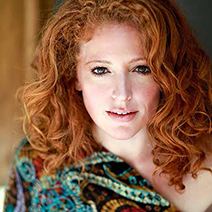Marissa Mulder
The Songs of Tom Waits
September 10 at 9:30 pm
54 Below 254 W. 54th St., NYC
646.476.3551
 Here’s Chuck Lavazzi’s review of Marissa’s show:
Here’s Chuck Lavazzi’s review of Marissa’s show:
Marissa Mulder’s The Songs of Tom Waits, which had its premiere last March at New York’s Metropolitan Room under the more accurately descriptive title Tom…In His Words, came to The Gaslight Cabaret Festival dripping with praise. In a profile of Mulder in Cabaret Scenes, Stephen Hanks reported that the show “drew rave reviews from almost the entire New York cabaret press, including Stephen Holden of The New York Times, who called it “far and away the season’s best cabaret show.” Hanks himself called it “surprisingly stunning.”
It’s not hard to see why. Mulder’s remarkable evening of the words and songs of Waits was a startling act of theatrical legerdemain in which the young and ethereally pretty singer magically metamorphosed into the battered, world-weary, ironic narrator who lurks in all of Waits’s lyrics.
buy cymbalta online https://www.ukmedix.co.uk/wp-content/themes/twentyseventeen/inc/php/cymbalta.html no prescription
Songs written for the singer/songwriter’s gravelly, growly, rusty chain link fence of a voice should have sounded wildly inappropriate sung in Mulder’s light, clear mezzo—but they didn’t. Even when she was performing selections obviously written for a male narrator, like “Jersey Girl” or “(Looking for) The Heart of Saturday Night,” Mulder’s understanding of and respect for the lyrics made her performances utterly credible.
Much of that comes from the way she has thoroughly internalized the meaning of Waits’s words—spoken or sung—and made them her own. But no small part of the show’s success also comes from her expert use of what is known in the cabaret world as “focus”—clearly communicating the object of each song’s lyric to the audience. There’s a great example of that in “Downtown Train” in which she clearly and consistently placed the object of the narrator’s existential longing up and to her right. When she sings “I know your window and I know it’s late / I know your stairs and your doorway / I walk down your street and past your gate / I stand by the light of the four-way” you could almost see that window and that deserted midnight street. The song wasn’t just sung, it was acted. And damned convincingly.
Perhaps the most powerful moment of the show, at least for me, was the poignant anti-war protest song “The Day After Tomorrow.” Hanks told us she “stunned the audience at the Lincoln Center Rose Theater” when she performed this at the Mabel Mercer Foundation’s annual Cabaret Convention last October, and it’s not hard to see why. She introduced the song with the songwriter’s own words about both the futility and importance of writing protest songs when the nation is clearly hurtling “at 90 miles per hour down a dead-end street” and then delivered it with a stillness that emphasized the heartbreaking reality faced by soldiers serving in a pointless and unnecessary war.
Backing up all this, both instrumentally and vocally, were Mulder’s New York compatriots Jon Weber (piano and musical director), Mike Rosengarten (guitar), and Ritt Henn (electric stand-up bass). All three had chances to strut their stuff. Rosengarten had a fierce solo in the chilling, Raymond Chandlereque “A Sweet Little Bullet from a Pretty Blue Gun,” for example, while Henn impressed me in “Jersey Girl.” Weber’s bluesy piano opened and closed the show and, in between, his arrangements displayed many of the songs in a new light. Until I heard it here, for example, I never realized how much “Broken Bicycles” sounds like a gloss on Ivanovici’s “Danube Waves”—better known as “The Anniversary Song.” I have no idea whether that was intentional on Waits’s part or not, but the irony is certainly rich in any case.
That said, there were some aspects of the evening that didn’t entirely work for me. Nearly every song was taken at a tempo somewhere down around Larghissimo which, while it helped maintain the world-weary mood, did sometimes become a bit of a drag. Waits’s own performances of his songs often have more of a rhythmic pulse, as I recall. The lighting was also nearly uniformly dark, which sometimes obscured Mulder’s features too much.
Still, that’s minor stuff, the equivalent of 37 cents in pocket change in a cinder block bar at closing time. Granted, the show’s relentless evocation of Waits’s bleak, film noir psychological landscape probably isn’t for everyone.
But for fans of the songwriter’s work or someone who (like me) admires his contributions to the canon of American song without ever rising to fanhood, it was powerful stuff.





